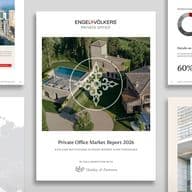
- 5 min.
- 12.11.2025

Property ownership can result in a variety of taxes. These are generally determined by the location of the property – namely, in the canton where the property is located. This means that one person owning property in various cantons may be liable to pay taxes to different cantons. In such cases, different cantonal taxation systems come into effect, with the result that the taxation of property can easily become a rather complicated issue.
This guide aims to provide an overview of the tax implications of property ownership and property transactions. The main focus is on private property. Your local Engel & Völkers advisor will be happy to assist you or recommend experts.
Properties held as private assets may result in the following types of tax:
Income from privately held property is subject to income tax, which is levied by the Swiss government, the cantons and the municipalities. Income includes rental income, in particular – or, if you live in the property yourself, the imputed rental value. In return, all maintenance costs and financing costs (in particular, mortgage interest and early repayment costs incurred) can be deducted; what cannot be deducted are any expenses increasing the value of the property that were only declared as capital expenses at the time of a sale that was subject to capital gains tax.
Private property is subject to wealth tax. Debts owed on the property may be deducted from wealth tax. The wealth tax is levied at the cantonal and municipal level. The government itself does not levy any wealth tax.
This is a cantonal (sometimes municipal) tax that is due whenever a profit is made on the sale of a property. The amount that is taxable is the actual profit made at the time of the sale. Possible profits from any sale are not taxable at a national level. Private property is thus subject exclusively to capital gains tax. Capital gains tax also recognises various tax deferral mechanisms (such as inheritance, division of matrimonial property, replacement purchase). These can mean that the property is only taxed upon a future change of hands.
Real estate that is being transferred may result in the following types of tax.
Property transfer tax is a purely cantonal or municipal tax. As its name implies, it is paid when a property changes hands from a previous to a new owner. All cantons recognise different property transfer scenarios that are either exempt from tax or subject to a privileged rate (such as inheritance, division of matrimonial property, replacement purchase). In some cantons, there is no property transfer tax. Some cantons only charge a fee according to a fixed tariff (compensation for expenses not subject to taxes) or they charge this in addition to the property transfer tax.
Property tax is also a cantonal or municipal tax that is payable annually in a few individual cantons or municipalities and based on the fair market value. In contrast to wealth tax, debts owed on the property cannot be deducted from property tax and the full fair market value is taxed.
Provided that a property is for private use only, VAT is not due on either the sale or on letting the property. As a result, no input tax deductions can be made for investment or operating costs or for administrative costs. New builds differ in the following ways: If a property sale occurs before construction begins, this constitutes taxable real estate. If the sale or service contract is only signed once construction has begun, the supply of the property is tax-exempt. If property is used for commercial purposes and the landlord/buyer is subject to VAT, he/she may choose to subject the leasing or sale to VAT; in such cases, input tax may be claimed. If property is used by the owner for corporate purposes and the owner is subject to VAT, input tax may also be claimed. The VAT regime in relation to property is complex, and expert advice from a tax specialist may lead to significant cost optimisations in some cases.
The major taxable events relating to private property
Income from property is subject to income tax based on the location of the property. For private-use property, the imputed rental value is also taxable as hypothetical income. On the other hand, both mortgage interest and the maintenance costs can be deducted from taxable income. Investments increasing the value of the property are not eligible for deductions; however, they are used to calculate capital gains tax in the event that the property is sold. The taxable value of the property (minus the mortgage debt) is also subject to wealth tax. Moreover, individual cantons recognise a separate property tax that can be levied in place of, or in addition to, wealth tax.
The sale of a private property results in a tax-free capital gain for the seller on the national level (or a loss that is not tax-deductible). However, gains are subject to cantonal capital gains tax.
People become owners of private property through the sale, exchange, bestowal, inheritance or its change of ownership between spouses. The purchase itself does not generally lead to direct tax implications (except for property transfer tax, provided that this is payable by the buyer, at least in part, by law or as a result of an agreement between the parties). However, because most cantonal laws provide for the joint liability of the buyer or a statutory lien on property for capital gains tax and property transfer tax, suitable contractual safeguards are urgently required. This actual risk of liability on the part of the buyer can be avoided for capital gains tax, for example, by the buyer paying a portion of the purchase price (amounting to the previously determined maximum capital gains tax) directly to the relevant tax administration on behalf of the capital gains tax for the seller.
These rules for the sale of property logically also apply to the exchange of property (treated as a double purchase).
In the instance of inheritance or a gift, the capital gains tax due is deferred. The new owner can thus speak of having a deferred tax liability, which must be paid upon the sale of the property. In addition to capital gains tax, the cantonal inheritance/gift tax must be borne in mind, although the majority of cantons do not tax the transfer of ownership to family members and spouses/registered partners. Fiscal sovereignty is governed by the property’s location.
Capital expenses only apply in the event of the sale of the property. The imputed rental value is not taxable during the construction phase. With regard to significant personal contributions during the construction of a property, possible tax and social security implications must be discussed on a case-by-case basis.
For remodelling or renovation, the expenses must be categorised either as those related to maintenance or those with a value-enhancing character according to professional practice / the instructions of the relevant cantonal tax authorities; maintenance expenses can be deducted from taxable income in the relevant tax year, while value-enhancing investments can only be taken into account as capital expenses in the event of a sale that is subject to capital gains tax. Tax legislation also allows for an optional maintenance lump sum in addition to the actual and proven maintenance costs (each tax year, it is possible to choose between applying the actual maintenance costs or the maintenance lump sum).
In summary, therefore, we can say that it is significant from a tax point of view whether investments are made to maintain the value of a property for occupancy, or to increase its value. It may be fiscally advantageous to stagger larger investments, or to spread them across two calendar years.
Rental income or, in the event of owner occupancy, the imputed rental value (theoretical income) are subject to income tax. The actual maintenance costs or lump sum, as well as debt interest, are deductible from taxable income. The fair market value of the property is subject to wealth tax, although debts may be deducted.
The imputed rental value for owner-occupied properties is taxed as income in the same way as rental income from rented properties (generally speaking, the taxable imputed rental value [and the amount liable for wealth tax] is a little lower than the rental income obtained from third parties [disposal value]). The taxation of imputed rental income also applies to domestic holiday homes. The imputed rental income is calculated by the cantonal tax administrations in accordance with relevant provisions or estimated and the owners informed.
All net assets are covered by wealth tax. The value of a property is thus a taxable asset and taxable at a cantonal level. However, the calculation of the amount subject to wealth tax is not always done in accordance with consistency across all cantons.
Private debt interest on mortgages is tax-deductible. However, there is an upper limit that must be borne in mind, according to which the total tax-deductible debt interest may not exceed CHF 50,000 – exclusive of the expected returns from moveable and immoveable assets. Interest on building loans may not be deducted in accordance with Swiss jurisdiction for the purposes of direct federal tax because interest on building loans are classed as capital expenses. The cantons deal with interest on building loans differently; sometimes, interest on building loans are permitted as expenses deductible from taxable income, and sometimes they are treated as capital expenses.
Mortgages and all debts owed on a property may be deducted from taxable assets. In comparison to debt interest for income tax purposes, there is no upper limit in terms of debts for wealth tax purposes.
For private property, the maintenance costs (provided they are ascribed to maintaining the property), insurance premiums, costs for administration and repair costs (including for newly acquired properties) can be deducted. With regard to maintenance costs, it is possible to choose every year between a lump sum and the actual, proven costs. For owner-occupied property, electricity costs, water costs, caretaker costs, etc. are all categorised as living costs and are not taxable. Expenses that increase a property’s value are viewed as capital expenses and can only be recognised at the time of a sale upon which capital gains tax is due. Expenses that represent a mixture of maintenance and investment costs must be divided into maintenance and investment categories (e.g. the renovation of a 30-year-old bathroom, resulting in a significant increase in the standard of the property; simple, old bathroom is renovated into a luxurious bathroom with every conceivable convenience). The same distinction applies for repair costs for newly acquired properties.
Important: Capital gains tax is generally only levied by the cantons; in some cantons it is also levied by the municipalities. In the cantons of Zug and Zürich, it is only levied by the municipalities. The property transfer tax and property tax are treated differently in the individual cantons and municipalities. There are also cantons where these taxes are not applied.

If a natural person is taxed as a commercial property handler, the property is taxed as if it were a business asset. This can have a significant impact on the tax burden of the individual and significant implications for social security. There is no general definition of what constitutes a “commercial nature”, rather, it is based on criteria and indices in Swiss jurisdiction. The tax authorities apply this to specific cases and have a significant room for manoeuvre in applying the categorisation. Some indices include:
Number of sales and purchases
Short periods of ownership
Excess third-party financing
Proximity to place of business or specific expert knowledge (e.g. architects, real estate agents and property managers)
Necessity of making a profit from property transactions as a means of subsistence
Overall project realisation in particular can become complicated (including through joint beneficiaries) through the creation of a commonhold and the subsequent sale of the individual units, as well as the sale of several multi-dwellings units or individual property units within a short space of time.
If properties are held by a legal person (or a natural person as a business asset), they are generally subject to normal taxation on profits (income) and capital (wealth). In several cantons, property ownership requires intercantonal tax allocation.
The taxation of the sales profit is applied by some cantons as part of the normal cantonal taxation on profits (income), which is known as the monistic system (LU, OW, GL, ZG, FR, SO, SH, AR, AI, SG, GR, AG, TG, VD, VS and NE), while the remaining cantons remove capital gains from taxation on profits (income) and register them under capital gains tax (the recontributed depreciation is also recorded under taxation on profits [income tax] in these cantons). For property held as a business asset, depreciation is permitted in the scope of the actual loss of value of the rates of depreciation recognised under tax law. What must be taken into account is that all transactions between the company and its owner or persons closely associated with the owner must take place at fair market conditions.
Tax-optimising acts, such as renting your own property at reduced rent, or transferring it to become a private asset for a low price, are thus only possible in very limited circumstances. The distribution of profits of a legal person to the owner in the form of dividends is also subject to income tax, transferring the property from being a business asset to a natural person as a private asset represents a realisation of revenue under tax law and therefore is taxable.
Due to the concrete owner strategy, individual cases must be carefully checked to see whether it would be more advantageous for the property to be held by a legal person instead of as a private asset.
Property and tax are a very complex area of Swiss tax law. This guide aims to answer the major questions but cannot replace expert assessments of specific situations. If you have any questions, please ask for a consultation. Your Engel & Völkers real estate agent will be happy to advise you.
According to the law, land includes property, individual and permanent rights listed in the land registry, mines and co-ownership shares of land.
If a plot of land is meant, a property can also be called land.
Taxation takes place at a later date. Tax is not exempt but deferred to a later date.
A potential tax liability that the new owner assumes with tax deferral mechanisms in conjunction with capital gains tax (e.g. inheritance).
The cantons are exempt from applying the monistic or dualistic systemfor profits made from land. In the monistic system, every sale is subject to capital gains tax, regardless of whether the land is held as a private or business asset or belongs to a legal person. However, recontributed depreciation is taxed as a business asset, or as profits or income tax for legal persons. In the dualistic system, gains made from land are subject to different taxation strategies. Land held privately is subject to capital gains tax, while land held as a business asset or by a legal person is taxed with profit or income. Property and tax are a very complex area of Swiss tax law. This guide aims to answer the major questions but cannot replace expert assessments of specific situations. If you have any questions, please ask for a consultation. Your Engel & Völkers real estate agent will be happy to advise you.
You may also be interested in








Contact


Engel & Völkers Switzerland
Poststrasse 26
6300 Zug | Switzerland
Tel: +41 41 500 06 06